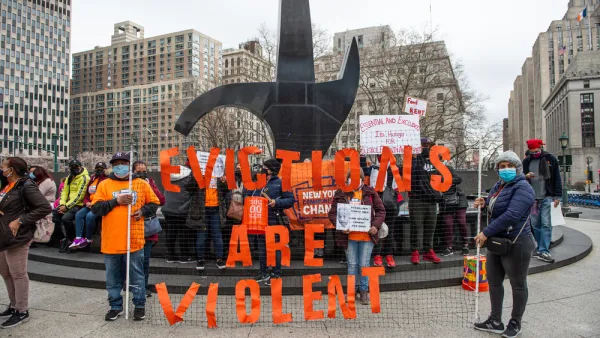A wave of new legislation targets people who reside illegally in properties they don’t own.

States including New York and Georgia are cracking down on squatters, reports Mary Salmonsen in Smart Cities Dive.
Until recently, people living in a unit illegally for over 30 days in New York State were considered tenants, forcing the owner into a judicial eviction process. “On April 22, New York Gov. Kathy Hochul signed the 2025 state budget, which changed the state’s property law to say that squatters are not considered tenants on any timeframe, effective immediately.”
Other states with new anti-squatting legislation include Florida, where a new bill criminalizes squatting, and Alabama, where new legislation creates a process for removal. “United States Rep. Dan Meuser, R-Pa., also introduced a bill in the U.S. House on April 10 that, if passed, would define trespassing or squatting as grounds for deportation for any non-U.S. citizen.”
As Salmonsen explains, “The laws colloquially referred to as ‘squatters’ rights’ can also encompass adverse possession, in which a person who does not own a property may acquire title to it under certain circumstances.” According to M. Denzell Moton, attorney and owner of Moton Legal Group in Atlanta, the new laws are not expected to impact adverse possession clauses — which often deal with years or decades of residency — but will have a major impact on short-term squatters.
FULL STORY: States see wave of squatting-related legislation

National Parks Layoffs Will Cause Communities to Lose Billions
Thousands of essential park workers were laid off this week, just before the busy spring break season.

Retro-silient?: America’s First “Eco-burb,” The Woodlands Turns 50
A master-planned community north of Houston offers lessons on green infrastructure and resilient design, but falls short of its founder’s lofty affordability and walkability goals.

Delivering for America Plan Will Downgrade Mail Service in at Least 49.5 Percent of Zip Codes
Republican and Democrat lawmakers criticize the plan for its disproportionate negative impact on rural communities.

Test News Post 1
This is a summary

Test News Headline 46
Test for the image on the front page.

Balancing Bombs and Butterflies: How the National Guard Protects a Rare Species
The National Guard at Fort Indiantown Gap uses GIS technology and land management strategies to balance military training with conservation efforts, ensuring the survival of the rare eastern regal fritillary butterfly.
Urban Design for Planners 1: Software Tools
This six-course series explores essential urban design concepts using open source software and equips planners with the tools they need to participate fully in the urban design process.
Planning for Universal Design
Learn the tools for implementing Universal Design in planning regulations.
EMC Planning Group, Inc.
Planetizen
Planetizen
Mpact (formerly Rail~Volution)
Great Falls Development Authority, Inc.
HUDs Office of Policy Development and Research
NYU Wagner Graduate School of Public Service





























